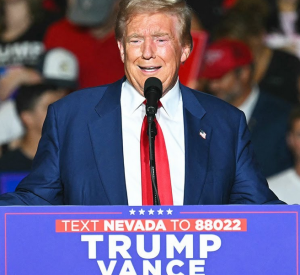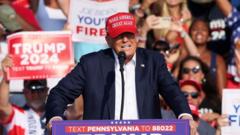As the 2024 election looms, Donald Trump's campaign is reorienting its focus towards minority communities, a demographic often overlooked in previous elections. The aim is to strengthen support through economic empowerment initiatives aimed at small businesses, challenging the traditional voting patterns evident in past cycles.
Trump Targets Minority Voters: A Shift in Campaign Strategy Ahead of 2024 Election

Trump Targets Minority Voters: A Shift in Campaign Strategy Ahead of 2024 Election
In a strategic pivot, Donald Trump's campaign is focusing on minority communities to enhance his electoral chances in the upcoming election.
Throughout various rallies and public engagements, Trump has highlighted economic policies designed to foster the growth of small businesses, resonating strongly with minority entrepreneurs. Advocating for lower taxes, less regulation, and increased funding in business programs, he frames himself as an advocate for self-sufficiency and financial growth. This strategy recalls successful aspects of his previous administration, such as Opportunity Zones, which drew investments into struggling communities.
Endorsements from key figures within the Black and Hispanic communities have boosted Trump’s outreach effort, showcasing partnerships focused on economic enhancement and community well-being. These endorsements are instrumental in connecting the traditional Republican voting base with more diverse groups seeking real change.
During campaign events, Trump has pointed out the gap between Democratic policies and the actual needs of minority communities, asserting that his economic approach provides a more effective route to empowerment. "We are committed to building stronger, safer communities where small businesses can flourish," he asserted in a recent address.
Targeting states with notable minority populations like Arizona and Nevada, Trump's campaign demonstrates that this outreach is based on concrete policy initiatives rather than mere rhetoric. By tailoring his messaging to appeal to minority business owners and workers, he seeks to reshape the electoral landscape in potentially surprising ways.
As Election Day nears, this renewed emphasis on economic growth and partnerships with minority communities may play a pivotal role in influencing independent and undecided voters. For many, Trump's commitment to entrepreneurship and economic revival could significantly impact their voting decisions.
Endorsements from key figures within the Black and Hispanic communities have boosted Trump’s outreach effort, showcasing partnerships focused on economic enhancement and community well-being. These endorsements are instrumental in connecting the traditional Republican voting base with more diverse groups seeking real change.
During campaign events, Trump has pointed out the gap between Democratic policies and the actual needs of minority communities, asserting that his economic approach provides a more effective route to empowerment. "We are committed to building stronger, safer communities where small businesses can flourish," he asserted in a recent address.
Targeting states with notable minority populations like Arizona and Nevada, Trump's campaign demonstrates that this outreach is based on concrete policy initiatives rather than mere rhetoric. By tailoring his messaging to appeal to minority business owners and workers, he seeks to reshape the electoral landscape in potentially surprising ways.
As Election Day nears, this renewed emphasis on economic growth and partnerships with minority communities may play a pivotal role in influencing independent and undecided voters. For many, Trump's commitment to entrepreneurship and economic revival could significantly impact their voting decisions.





















